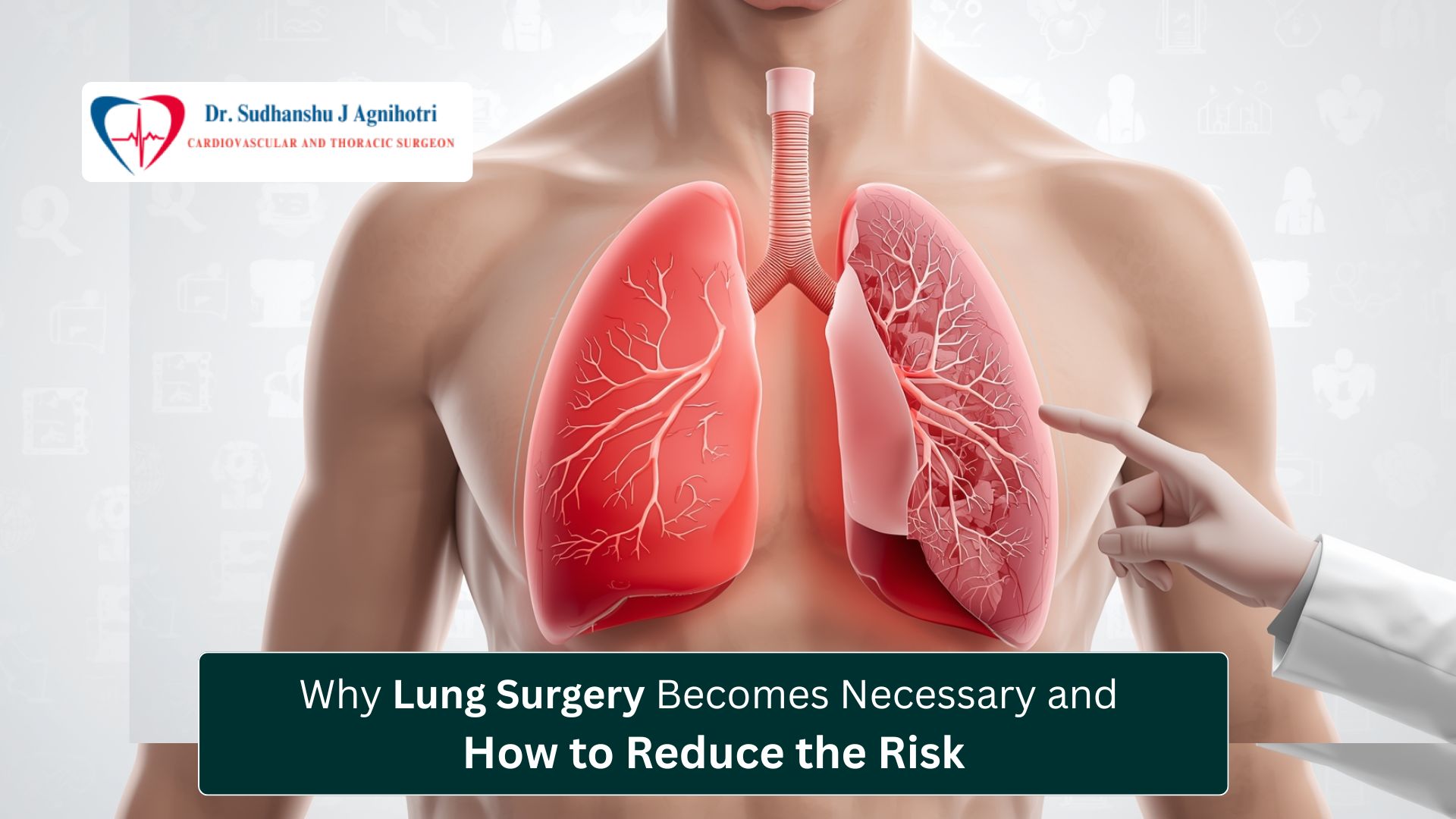Why Lung Surgery Becomes Necessary and How to Reduce the Risk
Understanding Lung Surgery: Causes, Risks, and Prevention
When it comes to vital organs, the lungs rank high on the list. They allow us to breathe, provide oxygen to our blood, and maintain life itself. However, due to medical conditions such as infections, tumors, or injuries, lung surgery sometimes becomes necessary. In recent years, specialized experts like Dr. Sudhanshu Cardiothoracic Surgeon have played a crucial role in treating complex lung problems, offering hope to patients and their families.
This article will walk you through the causes, risks, and preventive measures of lung surgery while answering some of the most common questions patients have.
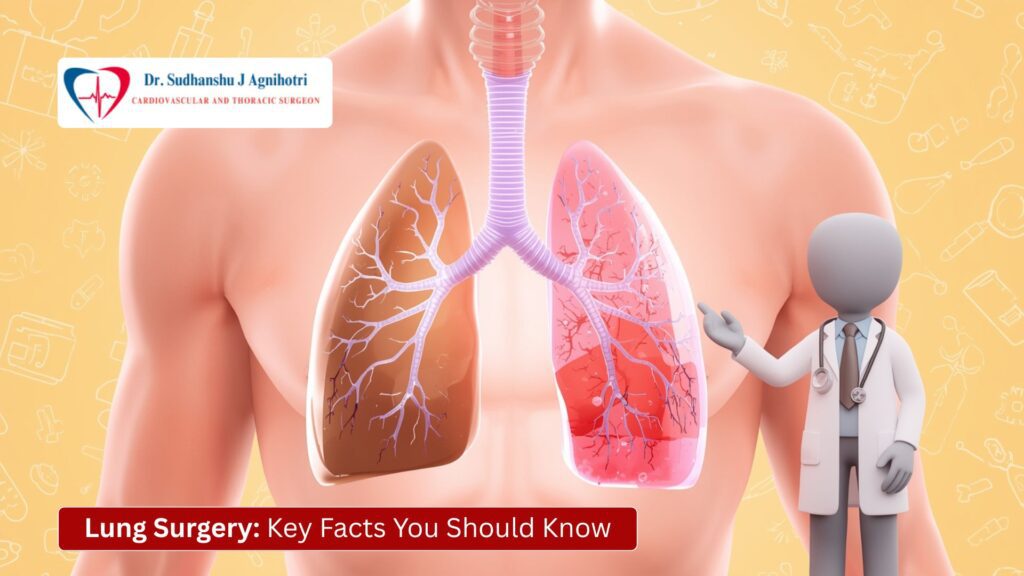
Causes of Lung Surgery
Lung surgery is often performed when less invasive treatments fail to restore lung health. Some common causes include:
- Lung Cancer: One of the most common reasons, where part or the entire lung may need removal.
- Collapsed Lung (Pneumothorax): Air leaks into the space between the lung and chest wall, causing the lung to collapse.
- Severe Infections: Tuberculosis or recurring pneumonia that damages lung tissue.
- Pulmonary Nodules: Suspicious growths or tumors that need removal.
- Trauma or Injury: Accidents leading to internal bleeding or lung damage.
According to Dr. Sudhanshu Cardiothoracic Surgeon, early diagnosis is key in minimizing surgical risks. Patients who seek timely medical advice often have better recovery rates compared to those who delay treatment.
Is Lung Surgery Dangerous?
This is one of the most common concerns for patients. Lung surgery, like any major operation, does carry risks. These risks include bleeding, infection, breathing difficulties, and sometimes, complications from anesthesia.
However, with advancements in technology and minimally invasive techniques such as Video-Assisted Thoracoscopic Surgery (VATS) and Robotic Surgery, the dangers have significantly reduced. Highly skilled specialists like Dr. Sudhanshu J Agnihotri, an experienced cardiothoracic surgeon, emphasize that proper pre-surgery evaluation and post-surgery care can drastically improve patient safety.
In summary, while lung surgery is not without risks, under the hands of experts such as Dr. Sudhanshu Cardiothoracic Surgeon, it has become much safer than it was decades ago.
What to Eat After Lung Surgery?
Nutrition plays a vital role in healing after surgery. Patients often experience reduced appetite due to anesthesia, medications, or pain. Still, the body requires extra nutrients to heal. Some dietary tips include:
- Protein-Rich Foods: Chicken, fish, eggs, beans, and lentils help repair tissues.
- Fruits and Vegetables: Rich in vitamins, minerals, and antioxidants to boost immunity.
- Whole Grains: Brown rice, oats, and whole wheat bread provide energy.
- Hydration: Water, clear soups, and fresh juices help flush toxins.
- Avoid: Fried foods, processed sugar, and carbonated drinks, as they slow healing.
As recommended by Dr. Sudhanshu J Agnihotri, smaller, frequent meals are easier for the body to process after lung surgery, and proper hydration helps in faster recovery.
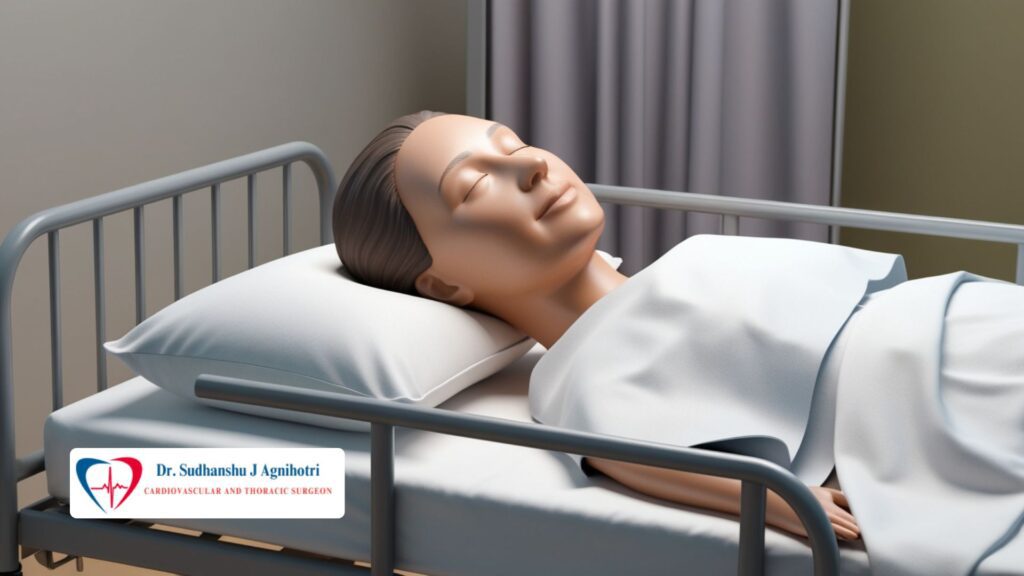
Sleeping Position After Lung Surgery
Good sleep is essential for recovery, but finding the right position can be challenging. Lying flat on the back often causes discomfort and breathing difficulty. Experts suggest:
- Elevated Position: Sleeping in a slightly upright position with pillows supports breathing.
- On the Non-Operated Side: If only one lung was operated on, lying on the opposite side may reduce pressure.
- Avoid Stomach Sleeping: It restricts lung expansion and may cause pain.
Dr. Sudhanshu Cardiothoracic Surgeon advises patients to use a recliner chair in the first few weeks, as it provides comfort and reduces strain on the chest.
Collapsed Lung Surgery Survival Rates
Survival rates for collapsed lung surgery (pneumothorax treatment) are generally very high. With modern techniques, most patients recover fully and return to normal life.
According to clinical reports and specialists like Dr. Sudhanshu J Agnihotri, the success rate for surgical treatment of collapsed lungs is above 95%. However, lifestyle factors such as smoking, existing lung disease, and overall health influence the long-term outlook.
Which Doctors Treat Lungs?
Lung-related conditions are managed by different specialists:
- Pulmonologists: Focus on lung function and respiratory diseases.
- Thoracic Surgeons: Perform surgeries related to the chest and lungs.
- Cardiothoracic Surgeons: Experts like Dr. Sudhanshu Cardiothoracic Surgeon who handle complex surgeries involving the heart, lungs, and chest.
For surgical treatments, patients are usually referred to cardiothoracic surgeons due to their advanced expertise in chest procedures.
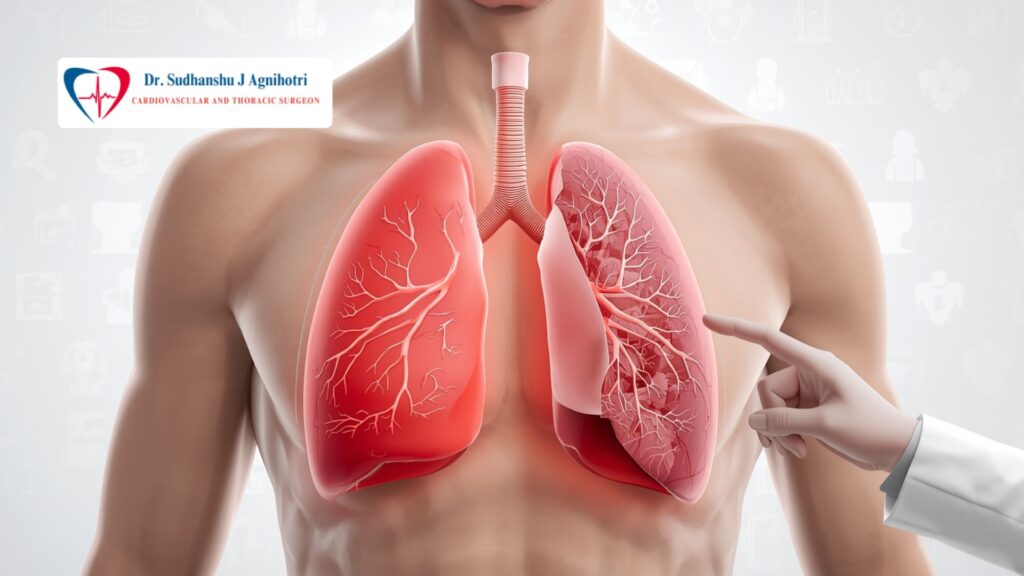
How Much Does Lung Surgery Cost in India?
The cost of lung surgery in India varies based on the city, hospital, and complexity of the case. On average:
- Basic Surgery: ₹2,00,000 – ₹4,00,000
- Advanced Procedures (like VATS/Robotic): ₹4,50,000 – ₹8,00,000
- ICU & Post-Operative Care: Additional charges may apply
Renowned surgeons like Dr. Sudhanshu J Agnihotri emphasize that while cost is an important factor, patients should prioritize quality care and advanced facilities for the best outcomes.
Prevention of Lung Problems
While not all lung issues can be prevented, lifestyle changes significantly reduce risks:
- Quit smoking and avoid second-hand smoke.
- Exercise regularly to keep lungs strong.
- Get vaccinated against flu and pneumonia.
- Avoid exposure to harmful pollutants.
- Go for regular health checkups.
As Dr. Sudhanshu Cardiothoracic Surgeon often advises, prevention is always better than cure. A healthy lifestyle is the best shield against lung-related diseases.
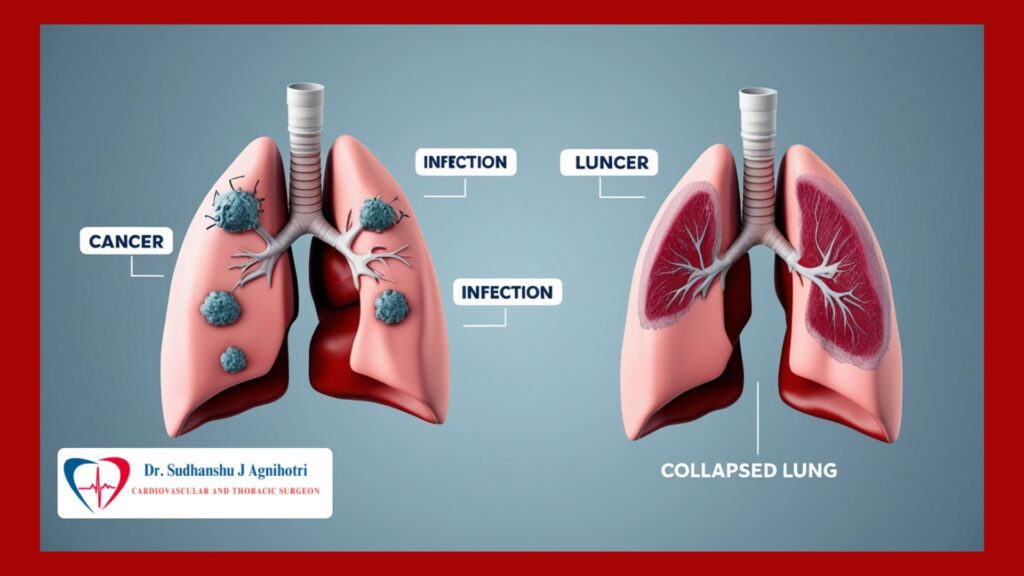
Conclusion
Lung surgery is a life-saving procedure in many cases, but it comes with its own set of risks and challenges. With modern medical advancements and the expertise of specialists like Dr. Sudhanshu J Agnihotri, patients have a much higher chance of safe recovery and improved quality of life. From choosing the right doctor to following proper diet and lifestyle, every step contributes to better healing and long-term wellness.
FAQs
1. Is lung surgery dangerous?
Yes, lung surgery has risks, but under experts like Dr. Sudhanshu Cardiothoracic Surgeon, it is much safer today due to advanced techniques.
2. What to eat after lung surgery?
Patients should focus on protein-rich foods, fresh fruits, vegetables, and whole grains for faster recovery.
3. Sleeping position after lung surgery?
Sleeping in a reclined position or on the non-operated side is most comfortable after surgery.
4. Collapsed lung surgery survival rates?
Survival rates are above 95% when treated by skilled specialists such as Dr. Sudhanshu J Agnihotri.
5. How much does lung surgery cost in India?
It typically ranges from ₹2,00,000 to ₹8,00,000, depending on the procedure and hospital.


